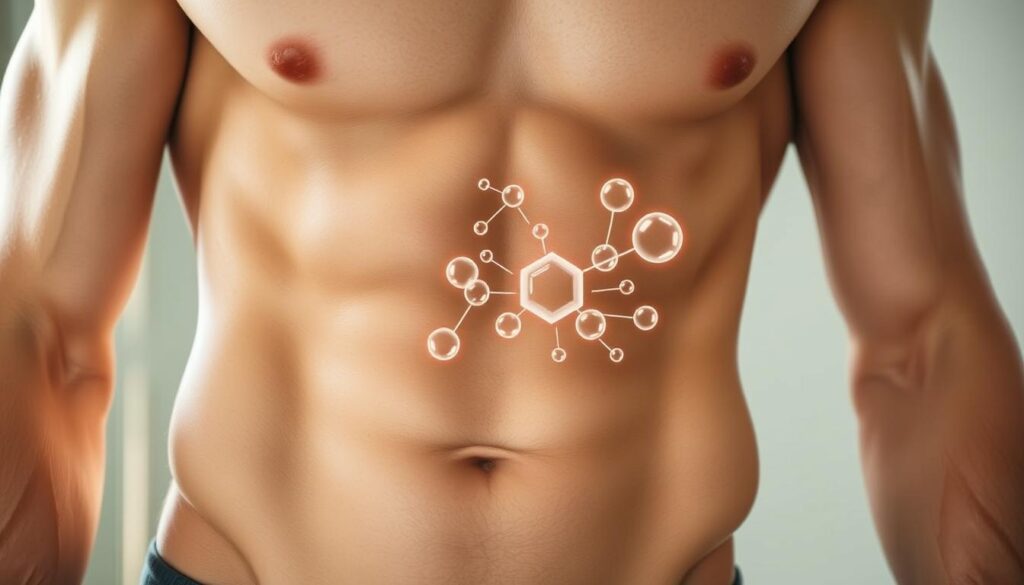As men age, their testosterone levels naturally decline, leading to a range of symptoms including low energy, reduced muscle mass, and decreased libido. By the age of 40, many men experience a significant drop in testosterone, affecting their overall vitality and well-being.
Maintaining healthy testosterone levels is crucial for men over 40 to preserve their physical and mental health. Fortunately, there are several natural ways to boost testosterone, enhancing vitality without resorting to synthetic hormones.
Key Takeaways
- Testosterone levels decline naturally with age.
- Low testosterone can lead to low energy and reduced muscle mass.
- Natural boosters can enhance vitality.
- Diet and exercise play a crucial role in hormone balance.
- Stress management is vital for maintaining healthy testosterone levels.
Understanding Testosterone’s Role in Men Over40
After the age of 40, men experience a natural decline in testosterone, which can impact their quality of life. Testosterone is a vital hormone that influences a range of bodily functions, from muscle mass and bone density to libido and overall energy levels.
The Natural Decline of Testosterone with Age
Testosterone levels peak during adolescence and early adulthood, then gradually decline with age. This natural decline can be exacerbated by factors such as poor diet, lack of exercise, and certain medical conditions.
Why Maintaining Healthy Testosterone Levels Matters
Maintaining healthy testosterone levels is crucial for men’s health. Low testosterone, or hypogonadism, can lead to a range of symptoms, including fatigue, decreased muscle mass, and reduced libido. Optimizing testosterone levels can significantly improve quality of life, enhancing vitality and overall well-being.
Benefits of Optimized Testosterone for Vitality
The benefits of optimized testosterone levels include increased energy, improved muscle mass, and enhanced libido. Moreover, healthy testosterone levels are associated with better bone density, reducing the risk of osteoporosis and fractures. Some key advantages of maintaining optimal testosterone levels are:
- Enhanced physical performance
- Improved mental clarity and focus
- Better overall health and well-being
As noted by experts, “Maintaining optimal testosterone levels is essential for men’s health as they age.”

Recognizing Low Testosterone Symptoms
As men age, recognizing the symptoms of low testosterone becomes crucial for maintaining overall health and vitality. Testosterone deficiency can manifest in various ways, affecting not just physical health but also emotional and cognitive well-being.
Physical Signs of Testosterone Deficiency
Common physical symptoms include fatigue, reduced muscle mass, and increased body fat. Men may also experience a decrease in bone density, leading to osteoporosis, and a reduction in hair growth. These physical changes can significantly impact a man’s quality of life.
Emotional and Cognitive Indicators
Low testosterone can also lead to emotional and cognitive changes, such as decreased motivation, irritability, and difficulty concentrating. Some men may experience depression or anxiety, further complicating their health.
When to Consider Natural Interventions
If you’re experiencing several of these symptoms, it may be time to consider natural interventions for low testosterone. Lifestyle changes, dietary adjustments, and certain supplements can help boost testosterone levels naturally. Consulting with a healthcare professional is a crucial step in determining the best course of action.
By recognizing the symptoms of low testosterone and taking proactive steps, men can potentially mitigate the effects of testosterone deficiency and improve their overall vitality.
Natural Testosterone Boosters for Men Over40
The natural decline in testosterone after 40 can be addressed with evidence-based natural solutions. As men age, their testosterone levels naturally decrease, which can lead to various physical and emotional changes. Fortunately, there are several natural testosterone boosters that can help mitigate these effects.
Overview of Evidence-Based Natural Solutions
Several natural substances have been studied for their potential to boost testosterone levels. These include:
- Dietary Changes: Consuming a diet rich in proteins, healthy fats, and certain nutrients can support testosterone production.
- Exercise: Regular physical activity, especially strength training and high-intensity interval training (HIIT), can help boost testosterone.
- Supplements: Certain supplements like vitamin D, zinc, and herbal extracts (e.g., ashwagandha, fenugreek) have shown promise in supporting testosterone levels.
- Lifestyle Modifications: Improving sleep quality, managing stress, and reducing alcohol consumption can also contribute to healthier testosterone levels.
Setting Realistic Expectations for Natural Methods
While natural testosterone boosters can be effective, it’s crucial to have realistic expectations. These methods may not produce immediate or dramatic results like pharmaceutical interventions. Instead, they offer a more gradual and sustainable approach to supporting testosterone health.
Men should be aware that individual results can vary widely based on factors such as overall health, lifestyle, and the specific interventions used.
Creating a Comprehensive Testosterone-Boosting Plan
A well-rounded approach to boosting testosterone naturally involves combining dietary changes, exercise, supplements, and lifestyle modifications. Here are some testosterone boosting tips to consider:
- Consult with a healthcare professional to identify the best strategies for your specific situation.
- Start with dietary adjustments and exercise routines that are known to support testosterone production.
- Consider adding supplements that are backed by scientific evidence, such as vitamin D and zinc.
- Monitor your progress and adjust your plan as needed.
By adopting a comprehensive and patient approach, men over 40 can effectively support their testosterone health and overall vitality.
Testosterone-Boosting Nutrition Plan
For men over 40, a testosterone-boosting nutrition plan can be a game-changer in enhancing vitality and overall health. A well-balanced diet rich in essential nutrients can support testosterone production, helping men maintain their energy, strength, and overall well-being.
Essential Nutrients That Support Testosterone Production
Certain nutrients play a crucial role in testosterone production. Zinc, for instance, is vital for maintaining healthy testosterone levels. Other essential nutrients include vitamin D, magnesium, and omega-3 fatty acids. Ensuring adequate intake of these nutrients through diet or supplementation can support testosterone health.
Top Foods That Naturally Enhance Testosterone
Incorporating specific foods into your diet can naturally enhance testosterone levels. Zinc-rich foods are particularly beneficial.
Zinc-Rich Foods for Hormone Health
- Oysters
- Beef
- Chicken
- Pumpkin seeds
These foods are not only rich in zinc but also provide other essential nutrients that support overall health.
Healthy Fats That Boost Testosterone
Healthy fats, such as those found in avocados, olive oil, and fatty fish, are crucial for hormone production. Including these foods in your diet can help support testosterone levels.
Meal Planning for Optimal Hormone Balance
Effective meal planning involves balancing protein, healthy fats, and complex carbohydrates. Aiming for a variety of whole foods, including vegetables, lean proteins, and whole grains, can help maintain optimal hormone balance. As noted by a leading nutrition expert, “A diet rich in whole foods can significantly impact hormone health.”
“The food you eat can either be the safest and most powerful form of medicine or the slowest form of poison.”
By focusing on nutrient-dense foods and a balanced diet, men over 40 can support their testosterone health and overall vitality.
Exercise Strategies to Increase Testosterone Naturally
For men over 40, incorporating the right exercise strategies can significantly enhance testosterone production. Exercise is a natural and effective way to boost testosterone levels, improving overall health and vitality.
Strength Training Routines for Maximum Hormone Response
Strength training is one of the most effective forms of exercise for increasing testosterone. Compound exercises that work multiple muscle groups at once are particularly effective.
Compound Exercises That Stimulate Testosterone
- Deadlifts
- Squats
- Bench Press
- Pull-ups
Optimal Training Frequency and Volume
Aim for 3-4 sets per exercise and train each major muscle group 3-4 times per week. Consistency and progressive overload are key to stimulating testosterone production.
High-Intensity Interval Training Benefits
High-Intensity Interval Training (HIIT) involves short bursts of intense exercise followed by brief periods of rest. HIIT has been shown to boost testosterone levels and improve metabolic health.
| Exercise Type | Testosterone Impact | Metabolic Benefit |
|---|---|---|
| Strength Training | High | Moderate |
| HIIT | Moderate | High |
Recovery Techniques to Optimize Testosterone Production
Adequate recovery is crucial for testosterone production. Techniques such as stretching, foam rolling, and sufficient sleep can enhance recovery and support hormone balance.
Lifestyle Modifications for Hormone Optimization
The key to naturally optimizing testosterone levels lies in implementing effective lifestyle modifications that address sleep, stress, and daily habits. By focusing on these critical areas, men over 40 can significantly enhance their hormone health and overall vitality.
Sleep Quality and Testosterone Connection
Sleep plays a vital role in hormone regulation, with research showing that poor sleep quality can lead to decreased testosterone levels. Ensuring adequate sleep and maintaining a consistent sleep schedule is crucial.
Stress Management Techniques
Chronic stress can negatively impact testosterone production by increasing cortisol levels. Effective stress management techniques, such as meditation and yoga, can help mitigate this effect.
Habits to Eliminate for Better Hormone Health
Certain habits can significantly impact hormone health. Two critical areas to address are alcohol consumption and exposure to environmental toxins.
Alcohol and Testosterone: Finding Balance
While moderate alcohol consumption may not significantly impact testosterone, excessive drinking can lead to decreased hormone production. Finding a balance is key.
Environmental Factors Affecting Hormone Levels
Exposure to certain environmental toxins, such as endocrine disruptors, can interfere with hormone production. Being aware of and minimizing exposure to these toxins is essential for maintaining healthy testosterone levels.
| Lifestyle Modification | Impact on Testosterone |
|---|---|
| Improved Sleep Quality | Increased Testosterone Production |
| Effective Stress Management | Reduced Cortisol, Balanced Testosterone |
| Moderate Alcohol Consumption | Minimal Negative Impact on Testosterone |
| Reduced Exposure to Environmental Toxins | Healthier Hormone Production |
By implementing these lifestyle modifications, men over 40 can take a proactive approach to optimizing their testosterone levels and enhancing their overall health and vitality.
Effective Supplements for Natural Testosterone Support
For men over 40, certain supplements have been shown to effectively support testosterone levels. While supplements should not replace a healthy lifestyle, they can complement diet, exercise, and other natural testosterone-boosting strategies.
Evidence-Based Herbal Supplements
Herbal supplements have been used for centuries to support various aspects of health, including hormone balance. Some herbs have shown particular promise in supporting testosterone production.
Ashwagandha and Testosterone Production
Ashwagandha is an adaptogenic herb that has been studied for its potential to reduce stress and support testosterone levels. Research indicates that ashwagandha supplementation can lead to significant increases in testosterone production, particularly in men experiencing stress or infertility.
Fenugreek and Other Proven Herbs
Fenugreek is another herb that has been investigated for its testosterone-boosting properties. Studies have shown that fenugreek supplementation can increase testosterone levels and improve symptoms associated with low testosterone. Other herbs like ginger and horny goat weed have also been explored for their potential benefits.
Essential Vitamins and Minerals
Adequate intake of certain vitamins and minerals is crucial for maintaining healthy testosterone levels. Vitamin D, magnesium, and zinc are among the nutrients that play a significant role in testosterone production. Ensuring sufficient levels of these nutrients through diet or supplementation can support natural testosterone production.
How to Choose Quality Testosterone-Supporting Supplements
When selecting supplements, it’s essential to choose products from reputable manufacturers that adhere to good manufacturing practices (GMPs). Look for supplements that have been third-party tested for purity and potency. Additionally, consider the form of the supplement and whether it aligns with your needs and preferences.
Conclusion
Optimizing testosterone levels is crucial for men over 40 to maintain vitality and overall health. By incorporating effective testosterone boosting strategies into daily life, individuals can experience significant improvements in their well-being.
A well-rounded approach that includes a testosterone-boosting nutrition plan, regular exercise, and healthy lifestyle modifications can help support natural testosterone production. Additionally, certain supplements have been shown to be effective in boosting testosterone levels.
By combining these ways to naturally boost testosterone, men over 40 can regain their energy, improve their physical performance, and enhance their overall quality of life. It’s essential to be consistent and patient, as natural methods may take time to produce noticeable results.
